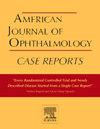有减肥手术史患者的眼部并发症
Q3 Medicine
引用次数: 0
摘要
目的本病例报告旨在强调减肥手术后因维生素A缺乏症(VAD)导致的严重眼部并发症的可能性,强调长期营养监测和依从性的重要性。我们报告一例角膜溃疡和眼表面角化发生在胆胰分流与十二指肠转换(BPD-DS) 8年后,并讨论其管理在有限的情况下获得肌内维生素a治疗。svad可在减肥手术后数年出现,并引起严重的眼部并发症。在本例中,不一致的复合维生素摄入导致干眼症和进行性视力丧失,因此强调了有减肥手术史的患者长期坚持补充维生素的重要性。由于当时全国范围内缺乏肌肉注射维生素a,因此使用了大剂量口服治疗。尽管耐受性良好,但病情进展到需要手术干预的地步。这个病例强调了早期发现、及时治疗和长期营养监测对肥胖患者预防不可逆转的视力丧失的重要性。结论和重要性evad可在减肥手术后数年出现并引起严重的眼部风险。虽然口服补充显示出潜力,但不足以防止手术干预。本病例报告旨在提高人们对手术后视力风险的认识,并强调有减肥手术史的患者长期营养监测和早期诊断的重要性。本文章由计算机程序翻译,如有差异,请以英文原文为准。
Ocular complications in a patient with history of bariatric surgery
Purpose
This case report aims to highlight the potential for severe ocular complications due to vitamin A deficiency (VAD) following bariatric surgery, emphasizing the importance of long-term nutritional monitoring and compliance. We present a case report of corneal ulceration and ocular surface keratinization occurring eight years post-biliopancreatic diversion with duodenal switch (BPD-DS) and discuss its management in the context of limited access to intramuscular vitamin A therapy.
Observations
VAD can present years after bariatric surgery and cause severe ocular complications. In this case, inconsistent multivitamin intake led to xerophthalmia and progressive vision loss, thus highlighting the importance of long-term adherence to supplementation in patients with a history of bariatric surgery. Due to a nationwide shortage of intramuscular vitamin A at the time, high-dose oral therapy was used. Despite being well tolerated, the condition progressed to the point of requiring surgical intervention. This case highlights the importance of early detection, timely treatment, and long-term nutritional monitoring in bariatric patients to prevent irreversible vision loss.
Conclusions and importance
VAD can present years after bariatric surgery and cause serious ocular risks. While oral supplementation showed potential, it was insufficient to prevent surgical intervention. This case report aims to raise awareness of post-surgical risks to vision and highlight the importance of long-term nutritional monitoring and early diagnosis in patients with a history of bariatric surgery.
求助全文
通过发布文献求助,成功后即可免费获取论文全文。
去求助
来源期刊

American Journal of Ophthalmology Case Reports
Medicine-Ophthalmology
CiteScore
2.40
自引率
0.00%
发文量
513
审稿时长
16 weeks
期刊介绍:
The American Journal of Ophthalmology Case Reports is a peer-reviewed, scientific publication that welcomes the submission of original, previously unpublished case report manuscripts directed to ophthalmologists and visual science specialists. The cases shall be challenging and stimulating but shall also be presented in an educational format to engage the readers as if they are working alongside with the caring clinician scientists to manage the patients. Submissions shall be clear, concise, and well-documented reports. Brief reports and case series submissions on specific themes are also very welcome.
 求助内容:
求助内容: 应助结果提醒方式:
应助结果提醒方式:


